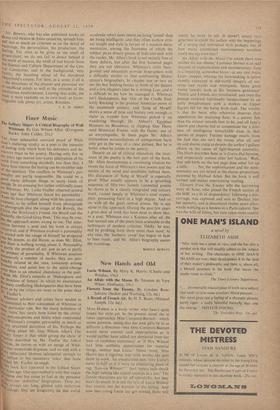Finer Music
THE most substantial outward proof of Whit- roan's enduring vitality as a poet is the intensity of feeling with which both his defenders and de- tractors react to his poetry. Having only five or six years ago moved into warm admiration of his work from something decidedly less than that, I know how intense the feeling can be on either side of the question. The conflicts in Whitman's per- sonality are partly responsible. He could be a good many different things to many kinds of People. In an amusing but rather unfriendly essay Ott Whitman, Mr. Leslie Fiedler objected Iseveral Years ago that Whitman faked his personality: Even his face changed, along with his stance and e°stille, as he willed himself from photograph 'to Chphotograph into the image of the Rody, the rist, the Workman's Friend, the Beardwand the butterfly, the Good Gray Poet.' This may be true, ut the approach seems wrong to me. The inter- action between a poet and his work is always .reeiprocal, and if Whitman evolved a personality 4) accord with the image of himself he projected illto his poems, so did Byron. so does Mr. Eliot, and there is nothing wrong about it. Personality is Partly the product of art, just as art is partly the Product of personality. If Whitman assumes s" fuccessively a number of masks, they are pro- t,undly related to the man, consistent among iinernselves. and point less to the quick-change artist than to an unusual abundance in the poet. I e think Mr. Eliot's remarks in 'Shakespeare and the Stoicism of Seneca' in which he enumerates ti Many conflicting Shakespeares that have been mven us by the critics are more to the point than r. Fiedler's. beWhitman scholars and critics have tended to ,4) eommitted to their conception of Whitman in the Particular role. But the sharp definition of tese 'roles' has surely been aided by the critics' u,,4,11 Preconceptions and limits when confronted h'Il Whitman's complex personality as much as b,:in1113,,r Years ago. One approached it with that vague Y practised deception of his. Perhaps the ;:ft thing about Mr. Gay Wilson Allen's The disitgrY Singer is that while giving the chest ..ff ialgtlises described by Mr. Fiedler. the fullest tl.gliton. he leaves us with an image of Whit- 4411 that transcends disguises, and we end with a iiv4tly delineated likeness substantial enough to Ne,hallast to the successive 'roles' that have rots Mr. Fiedler so much, Ll'ils book first appeared in the United States i arlsiness one has come to feel in the presence N `litn-..Tican 'definitive' biographies. They are :Y al ways too long, glutted with irrelevant ' colour; they are frequently (in that awful academic term) more intent on being 'sound' than on being intelligent; and they often eschew criti- cal insight and style in favour of a massive docu- mentation, among the footnotes of which the subject plays dreary games of hide-and-seek with the reader. Mr. Allen's book is not entirely free of these defects, but after the first hundred pages they are not obtrusive. Whitman's early back- ground and education provide biographers with a difficulty similar to that confronting Shake- speare's biographers. In chapter one or two we see the boy holding horses in front of the theatre and a few chapters later he is writing Lear, and it is difficult to see how he managed it. Whitman isn't Shakespeare, but 'Out of the Cradle End- lessly Rocking' is the greatest American poem of the nineteenth century. and 'Song of Myself' shows a sense of time and history rare enough to make us wonder how Whitman picked it up wandering through Dr. Abbott's Egyptian Museum on Broadway, or clipping 'One Thou- sand Historical Events, with the Dates,' out of an encyclopaedia. In these pages Mr. Allen's tremendous accumulations of unimportant facts only get in the way of a clear picture. But he is better when he comes to the poetry.
Despite an air of critical relaxation, the treat- ment of the poetry is the best part of the book. .Mr. Allen demonstrates a convincing relation be- tween the form of Whitman's best poems and the nature of the mind and sensibility behind them. His discussion of 'Song of Myself' is especially good. What usually appears to be a sprawling sequence of fifty-two loosely connected poems he shows to be a closely integrated and unitary work, rooted deeply in Whitman's total experi- ence, possessing form in a high degree. And so, on with all the great central poems. He is not alone in this approach. During the past few years a great deal of work has been done to show that, as a poet, Whitman was a Kosmos after all, He had seemed one of the poets least amenable to the techniques of modern criticism. Oddly, he may end by profiting from them more than most. At any rate, the 'barbaric yawp' has begun to fade to finer music, and Mr. Allen's biography assists the transition,
MARIUS BEWLEY


































 Previous page
Previous page